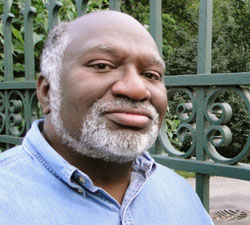“A number of the poems near the end of the book are about the difficult time my parents both had near the end of life. So I wrote a piece about how I’d always fantasized things would be like for them in their later years; it’s a reflection on the fact that the older you get, the more you realize that things don’t always turn out the way you wished they had.”

Charles Coe.
A Poem for Happy Endings
The hero gets the girl.
The villain plunges to his doom;
his bitter face disappears in fire and smoke.
The estranged lovers embrace,
while violins cue the audience
to reach for tissues.
The script I wrote for my parents included
father’s retirement scene: the crowded banquet
hall, speaker after speaker telling stories
filled with that rough humor
men use to disguise their love.
And then, the days fishing, tinkering with the
lawn mower, sitting on the porch with a western
novel, keeping a watchful eye on passing traffic.
Now the camera turns now to mother; in a long shot
we see the little grey house with garden in back,
a small figure kneels in the dirt, a big floppy hat
blocks the sun, a trowel digs a hole for next petunia.
Zoom in on a wrist fine-boned as a bird’s.
Who hands out the happy endings?
Who, late one night, stood outside
my parents’ home, gazed a moment at some mark
scrawled on the door, then just turned to walk away,
the sound of footsteps fading on the empty street?


Reader Comments